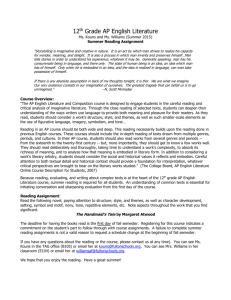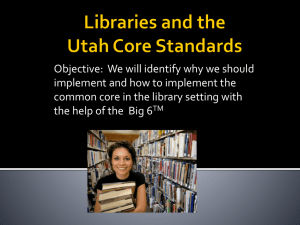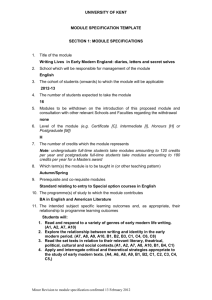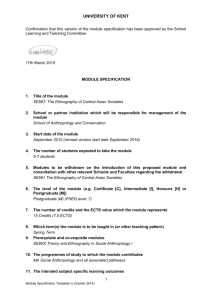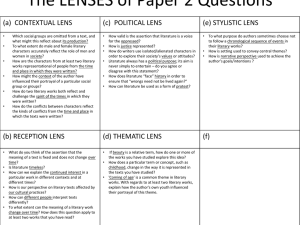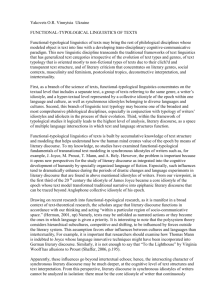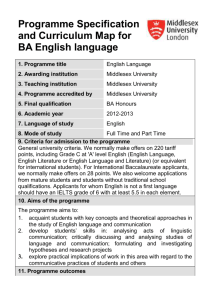University of Kent
advertisement
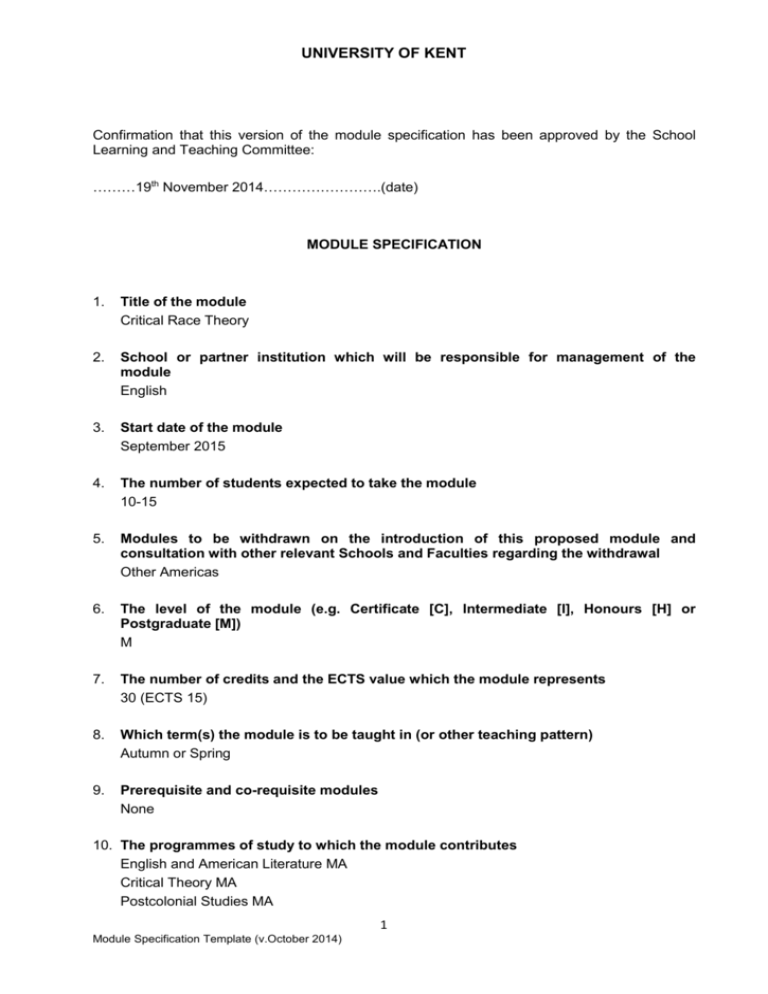
UNIVERSITY OF KENT Confirmation that this version of the module specification has been approved by the School Learning and Teaching Committee: ………19th November 2014…………………….(date) MODULE SPECIFICATION 1. Title of the module Critical Race Theory 2. School or partner institution which will be responsible for management of the module English 3. Start date of the module September 2015 4. The number of students expected to take the module 10-15 5. Modules to be withdrawn on the introduction of this proposed module and consultation with other relevant Schools and Faculties regarding the withdrawal Other Americas 6. The level of the module (e.g. Certificate [C], Intermediate [I], Honours [H] or Postgraduate [M]) M 7. The number of credits and the ECTS value which the module represents 30 (ECTS 15) 8. Which term(s) the module is to be taught in (or other teaching pattern) Autumn or Spring 9. Prerequisite and co-requisite modules None 10. The programmes of study to which the module contributes English and American Literature MA Critical Theory MA Postcolonial Studies MA 1 Module Specification Template (v.October 2014) UNIVERSITY OF KENT MA in the Contemporary American Studies MA 11. The intended subject specific learning outcomes On successfully completing the module students will be able to: 11.1 critically apply Critical Race Theory to 20th/21st century literary and cultural contexts 11.2 demonstrate understanding of how the particular theoretical, social and institutional frameworks in which 20th century conceptualisations of race are produced and policed 11.3 develop their understanding of the historical emergence of ideas of race, discrimination, racialisation, whiteness, equality, and so in relation to a range of ethnic minority and intersectional groups in North America (and the UK), and to apply these ideas to a range of literary and other cultural products 11.4 develop independent and original arguments both with, and in relation to, the theoretical tools supplied by Critical Race Theory 12. The intended generic learning outcomes On successfully completing the module students will be able to: 12.1 demonstrate their ability to apply new conceptual terms or frameworks to their study of literary and other cultural texts and to incorporate these in their own research 12.2 demonstrate awareness of the complexities of historical and theoretical contexts, ideas, and texts and develop critically insightful and original responses to said complexities 12.3 respond to and communicate complex problems clearly to specialist and non-specialist audiences 12.4 devise, undertake, and complete individual research projects, including regular documentation and evaluation, demonstrating methodical working practices, initiative, and self-direction 13. A synopsis of the curriculum This module helps students to develop a familiarity with the discourse of Critical Race Theory, with its origins in the combining of Legal Studies with Critical Theory, and with its application to a range of texts and contexts in North America and the UK. Students will examine particular instances in recent history in which race has been unsystematically and systemically defined and/or challenged in social and institutional terms. They will analyse particular trends in institutional racial and racialised discourse. And they will apply the concepts and terms of analysis that they learn to the examination of literary and cultural texts that reflect, refract, and challenge such discourse. Embedded in the course will be a running discussion of institutionalised discourses around race, which will be focused on analysis of equality of opportunity in the academy through the work of Ahmed and Kuokkanen. In the course of this module, then, students will be introduced to a range of writing, art, and performance from several ethnic groups in North America, including African American, Native American, and Chicano/a, and they will be asked to examine the ways in which prevailing ideas of race and the ways those ideas are manifested in and through legal, political, and cultural rhetorics, form and inform, inflect and are inflected by such paradigms as white privilege, intersectionality, biopolitics, equality, borders and border-crossing, resistance/activism, and racism. 2 Module Specification Template (v.October 2014) UNIVERSITY OF KENT 14. Indicative Reading List Ahmed, Sarah, On Being Included: Racism and Diversity in Institutional Life (2012) Anzaldua, Gloria Borderlands/La Frontera (1987) Baldwin,James Collected Essays (1988) Crenshaw, Kimberle et al Critical Race Theory: The Key Writings that Formed the Movement (1995) Frankenburg, Ruth ed. Displacing Whiteness (1997) Lorde, Audre Sister Outsider: Essays and Speeches (1981) 15. Learning and Teaching Methods, including the nature and number of contact hours and the total study hours which will be expected of students, and how these relate to achievement of the intended module learning outcomes This module will be team taught (alternate weeks by subject matter) by means of weekly 2 hour seminars for ten weeks. Total Contact Hours: 20 Independent Study Hours: 280 Total Study Hours: 300 16. Assessment methods and how these relate to testing achievement of the intended module learning outcomes The module will be assessed by a single research-based case study of specific highlight moments in the development of Race Theory and/or in the various resistance movements related to race and/or intersectionality including related texts and other cultural products. Examples might include FESTAC, the 1973 Wounded Knee siege, Executive Order 10925 (Affirmative Action), and so on. The final project, equivalent to a 5000 word essay, will account for 60% of the final grade and will relate to testing all of the specific learning outcomes in terms of their historical and theoretical knowledge (11.1, 11.2, 11.3) and to generic outcomes (12.1, 12.2, 12.3, 12.4) in terms of their ability to apply that knowledge to literary and other cultural contexts and to develop their ability to communicate clearly and effectively in written form. 30% of the grade will be related to the 400-500 word weekly log of research development (specifically related to generic learning outcome 12.4), and the remaining 10% will be awarded for a 15-20 minute oral presentation of their research project (which relates to generic outcome 12.3 in particular). 17. Implications for learning resources, including staff, library, IT and space This module draws on existing resources. 18. The School recognises and has embedded the expectations of current disability equality legislation, and supports students with a declared disability or special educational need in its teaching. Within this module we will make reasonable adjustments wherever necessary, including additional or substitute materials, 3 Module Specification Template (v.October 2014) UNIVERSITY OF KENT teaching modes or assessment methods for students who have declared and discussed their learning support needs. Arrangements for students with declared disabilities will be made on an individual basis, in consultation with the University’s disability/dyslexia support service, and specialist support will be provided where needed. 19. Campus(es) or Centre(s) where module will be delivered: Canterbury 4 Module Specification Template (v.October 2014)
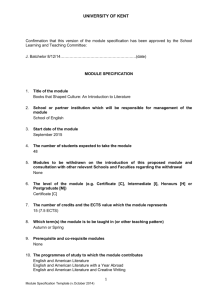
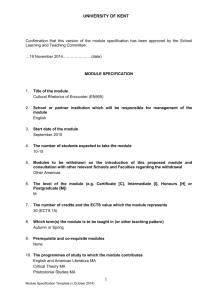
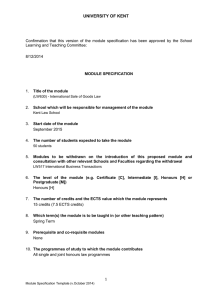
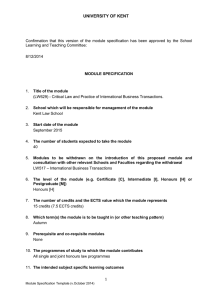

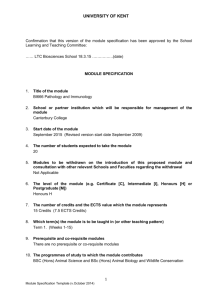

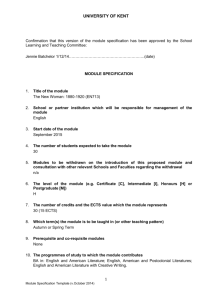
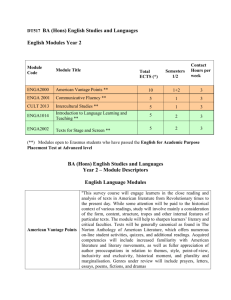
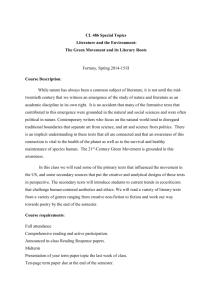
![EN665 [5] - University of Kent](http://s3.studylib.net/store/data/007665075_2-2a521757f83d879c30b96f0c1955e89a-300x300.png)
